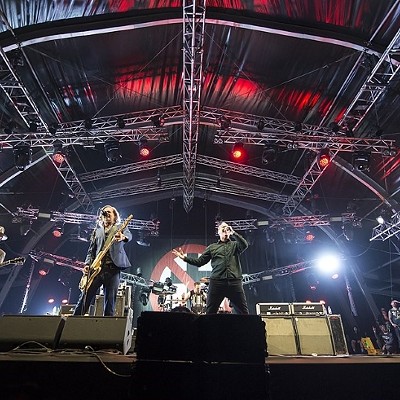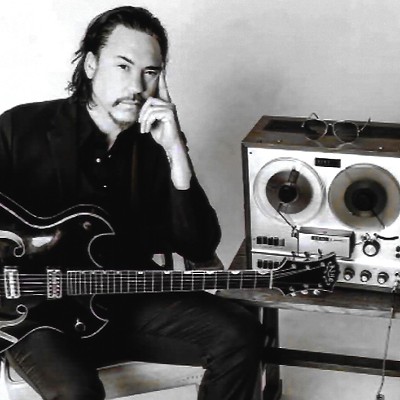When it comes to the whole unnecessary brouhaha between Nicki Minaj, Katy "FKA Twigs hairstyle" Perry, Taylor "Tay-Tay" Swift and ginger king Ed Sheeran over last week's VMA nominations, Nicki indisputably won the crown. No question about it. Part of the reason I concur with the comments Minaj made about the music industry is that, at least on a prima facie basis, she is 100 percent correct even without being able to fully state her case. What could have been advanced as a valid argument was derailed by the other side's deliberate discursive erasure, low-level diversionary tactics, and, rather predictably, Swift's penchant for passive-aggressive behavior.
If anyone really thinks Swift doesn't favor passive-aggressiveness, it would behoove said person to listen to the songs where she takes past relationships and disregards the element of privacy of the people involved to write her songs. Is it manipulative? Of course. Do most of Swift's fans appreciate this? Absolutely — ticket sales, album sales and Youtube views bear this out. Sure, in her defense she's neither the first nor the last singer-songwriter to use relationships as fodder for either her past country-pop ditties or current über-pop catalog. The thing is, Swift has manipulated and perfected this tactic — most profiles written about her highlight this as if it's a well-known part of her stylistic arsenal.
Minaj's Twitter critique was valid is because it wasn't ahistorical or decontextualized — as many counter-arguments made by the dominant culture about race often are — but because there's a historical basis for what she stated. The points Minaj made about the VMA nominations didn't resonate quite as much as her points about how black women have been treated by the industry and about people who avoid substantive issues in favor of fake controversy. “Black women influence pop culture so much but are rarely rewarded for it," Minaj tweeted. The whole conversation could have turned out to be more constructive and not as confrontational had Swift done her homework ahead of time, and she could have started with how Memphis Minnie's and Big Mama Thornton's work ("Hound Dog" was written by Lieber & Stoller) was later appropriated by Led Zeppelin and Elvis Presley, respectively.
There are so many other examples. Robert Palmer's cover version of "I Didn't Mean to Turn You On" became much more popular than Cherrelle's original — and Cherrelle had the better video, complete with a breakdancing King Kong. But Palmer had the pop-culture machine behind him and Cherrelle, a great singer, never crossed over. There are enough examples and stories like this to fill at least five books, never mind how current artists like Ledisi, Tamia, Amel Larrieux, Valerie June, Cold Specks and SZA — all extremely talented performers — consistently get overlooked for lesser pop artists. It's worth noting, however, that many artists who never cross over also seldom lose what made them distinctive in the first place, whether their relevance is based on style, content, culture or a combination of all three elements. A number of Detroit-based black women singers, many of whom signed to Motown during the 1960s, never saw the kind of success today's artists seem to take for granted: Mary Wells, Rose Batiste, Tammi Terrell, Florence Ballard, Kim Weston, and Brenda Holloway, to name a few. And sometimes when I think of the late Phyllis Hyman — one of the absolute best singers I've ever heard sing live — it's easy to reach the conclusion that part of what might have driven her to commit suicide was the cold nature and ruthlessness of the numbers-driven music business.
But Minaj knows music history and has paid tribute to pioneers like Roxanne Shanté and Notorious B.I.G. in songs and interviews. Her show-stealing verse on "Monster," is undoubtedly one of the highlights of Kanye West's My Beautiful Dark Twisted Fantasy, while her other guest features and recent Pinkprint album have only strengthened her position in today's pop-culture landscape. But Minaj isn't saying Iggy Azalea is the white Nicki, Tay-Tay is the white Beyoncé, and Miley Cyrus is the white Rihanna — as some people already have. She's really just saying the music industry, in the words of Zora Neale Hurston, treats black women as mules of the world. The argument also segues into the recent ongoing debate about cultural appropriation as expressed in Amandla Stenberg's now-legendary "Don't Cash Crop My Cornrows" video. Both Stenberg and Minaj have made salient points about cultural shifts and appropriation which are valid, but it's easy to see how this could go over someone's head. They're making these points in a bold, fiercely unapologetic way, though. It's honestly refreshing to see, especially when one considers how often black women are silenced in this society, rendered invisible, or reduced to the Angry Black Woman trope.
In response to all of Minaj's comments, Swift wrote, "I've done nothing but love & support you. It's unlike you to pit women against each other. Maybe one of the men took your slot." Not only did Swift miss the point, but in the last sentence, she undermined her own version of feminism. Sheeran, just like Peter from the Real Housewives of Atlanta, decided to jump into women's discussions and business; he also offered his nonsensical opinion based more on his connection to Swift than the realities of the music business. That fast-wordsmith style he borrowed from Twista and numerous R&B singers for his "U.N.I." song is obviously an appropriation of a unique style created by black artists. Even a number of white people complaining on Twitter suggested the idea of Sheeran being named "most important act in black and urban music" was just a really bad joke started by BBC 1Xtra and picked up by The Independent. Even though I'm not into Sheeran's music — and Andrew Unterberger of Spin magazine already made the case for how Sheeran once jacked Marvin Gaye's style — focusing on his role in what clickbait cesspool media erroneously refer to as a "feud" or "drama" is a waste of time.
What really matters here is that Minaj refused to be silenced by her detractors, offering, "They're not missing the point, they're just attempting to overshadow the point. Oldest trick in the book." Admittedly, I'm not really interested in Swift's latest music either; she was better as a country artist. It's not that folks like Sheeran and Swift make bad music. It's just not on the same level as pop music of the '70s, '80s and early MTV, during the channel's halcyon days. When I was in school, all the kids knew the words to Pink Floyd's "Another Brick in the Wall Part 2," I wore my AC/DC T-shirt to school, and at the Fonde Rec Center, all the kids would dance to The Art of Noise's "Beatbox" and "Jam On It" by Newcleus. We had a portable record player on the basketball court and would play all kinds of records. I remember when MTV was still good and you could watch cool videos: Golden Earring's "Twilight Zone," Donald Fagen's "New Frontier," Herbie Hancock's "Rockit," Michael Jackson's "Thriller," Joan Jett's "I Love Rock and Roll," Eddy Grant's "Electric Avenue," videos by the Human League, and my personal favorite, The Clash. Admittedly, the last two albums I listened to recently weren't pop albums: Pekka Airaksinen's Buddhas of the Golden Light and Quicksilver Messenger Service's Happy Trails live album from 1969 are about as far away from pop music as one can get.
I thought I was being called out. I missed the point, I misunderstood, then misspoke. I'm sorry, Nicki.
@NICKIMINAJ
— Taylor Swift (@taylorswift13) July 23, 2015What happened between Minaj and Swift, though, was more unnecessary melodrama than misunderstanding. It was one person — arguably the most highly favored pop star of the moment — inviting herself into a discourse and a range of subjects she isn't invested in. Long before Nicki Minaj, many black artists and performers have complained about the music industry. Chitlin' circuit performers rightfully addressed Jim Crow segregation and not being paid adequately — oftentimes performers during this era would be subjected to all kinds of mistreatment, such as not being able to eat dinner at the same hotel or venue where they were performing or having to stay at a sub-standard blacks-only hotel. There is also the sad phenomenon of backup singers who should have been bigger stars than the people they were backing up, as seen in the 2013 documentary Twenty Feet From Stardom, which featured frequent Late Show with David Letterman guest and Phil Spector-affiliated singer Darlene Love.
That means so much Taylor, thank you. @taylorswift13 ??????
— NICKI MINAJ (@NICKIMINAJ) July 23, 2015Personally, I think it was good for Minaj to speak up about how the industry really is. She wasn't deconstructing it financially the way the late Lisa "Left Eye" Lopes did — just making an observation and speaking her mind without making ad hominem attacks, as many pop-culture figures often do. And perhaps more people who benefit from the pop-culture machine should speak up about 1) How destructive it can be at times; and 2) How to create a better music industry once the current one implodes. It's also good to know Minaj and Swift had a telephone conversation about all of this, and perhaps that's a good place to start.
It doesn't change the fact that MTV sucks nowadays, though.





